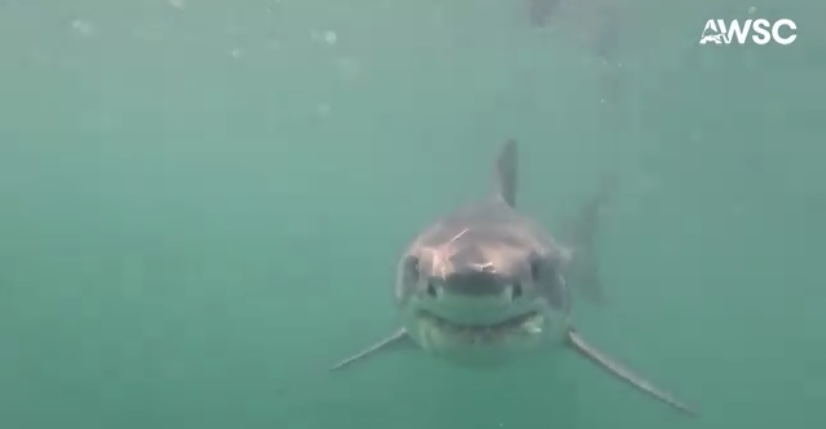
Massachusetts approves new rules to restrict shore-based shark fishing
Are you one of those fishermen chasing social media clout by landing a great white shark?
Well, Bay State marine officials are sending a message: They have added “teeth” to regulations to restrict this type of shore-based shark fishing ahead of the upcoming white shark season along Cape Cod.
Massachusetts rules already ban fishermen from attracting and capturing white sharks, but enforcement has been challenging for the Massachusetts Environmental Police. That’s because regulations have required police to prove the angler’s intent to target white sharks — and fishermen will typically claim they are lawfully targeting other shark species.
But now, after the Massachusetts Marine Fisheries Advisory Commission voted to approve Division of Marine Fisheries regulatory recommendations, the more straightforward rules should better restrict shore-based shark fishing and help with enforcement.
“The new regulations are designed to limit shore-based fishing for white sharks on Cape Cod, where they are most abundant and most often targeted,” said Division of Marine Fisheries Director Daniel McKiernan.
“Shore-based fishing for white sharks poses a serious public safety risk because it increases the chances of people coming into contact with white sharks and interferes with other beach activities,” the director added. “Based on input from the public, we believe the new regulations balance public safety while still allowing shore-based recreational fishing opportunities for other species.”
Shore-based shark fishing has been growing in popularity, particularly through social media, with more anglers interested in targeting great white sharks.
Massachusetts, particularly Cape Cod, is a burgeoning hotspot given the seasonal abundance of white sharks close to shore and the state’s relative lack of restrictions.
“There is a large contingent of anglers on social media that are looking for that viral video of them shark fishing, particularly for white sharks,” said Jared Silva, a fishery policy analyst with the Division of Marine Fisheries.
Fishing and chumming activity brings white sharks closer to shore, increasing the likelihood of interactions between people and white sharks.
Also, the use of drones to launch baits out past the surf can attract white sharks — and spark conflicts with other beach users.
Silva noted the large crowds of tourists that descend upon the Cape during the summer, as fishermen try to lure white sharks.
“They can’t co-exist,” Silva said. “It’s a huge public safety issue.”
Related Articles
After Massachusetts fishermen were seen ‘targeting’ white sharks, state looks to better restrict shore-based shark fishing
First right whale mom and calf of the season spotted in Cape Cod Bay: ‘Hope for the species’
100-plus sharks tagged off Cape Cod were detected along Maine: ‘White sharks that visit Cape Cod travel well beyond these waters’
Shark attack data: US again has the most reported bites, with Florida leading the way
6,000-pound massive shark washes up on Cape Cod in the winter: Possibly ‘made a wrong turn’ and got trapped
The new rules that the Marine Fisheries Advisory Commission approved include banning shore-based shark fishing in specific areas where white sharks are common.
“The coastline beginning at the northernmost point of Plymouth Beach then south to the Cape Cod Canal in Sandwich, then eastward along the southern shore of Cape Cod Bay to Rock Harbor in Orleans, then northward along the eastern shore of Cape Cod Bay to Race Point in Provincetown, then south along the eastern Atlantic facing shore of Cape Cod, inclusive of all of Monomoy Island and Chatham Harbor,” the rules read.
The waters along the South Cape and Islands, where recreational shark fishing for non-white shark species has historically occurred, are not included in the regulations.
The regulations ban chumming when shore-based shark fishing from sunrise to sunset in Massachusetts, and the rules prohibit the use of mechanized or remote-controlled devices to deploy baits when fishing from shore with rod and reel gear.
The only member of Marine Fisheries Advisory Commission who opposed the rules was Tim Brady, who said he was concerned about this limiting access to fishing for other shark species.
“I understand the potential user group conflict, but are we also preventing somebody who’s targeting a different shark species, which they can target?” Brady asked during the commission meeting.
He also questioned the chances of attracting a white shark.
But shark scientist Greg Skomal in response said it’s “quite easy” to target a white shark, particularly along the eastward facing beaches of the Cape.
“The abundance that we see out there is mind blowing,” Skomal said. “They are quite close to shore.”
The new rules give the environmental police the “teeth they need to be able to enforce this activity,” he added.
Skomal said the other shark species are found along the southern side of the Cape and Islands, and not in the banned area, so there will be “little impact on those existing fisheries.”
Subject to the final regulatory review process, the changes approved by the commission are anticipated to go into effect for the upcoming season.


